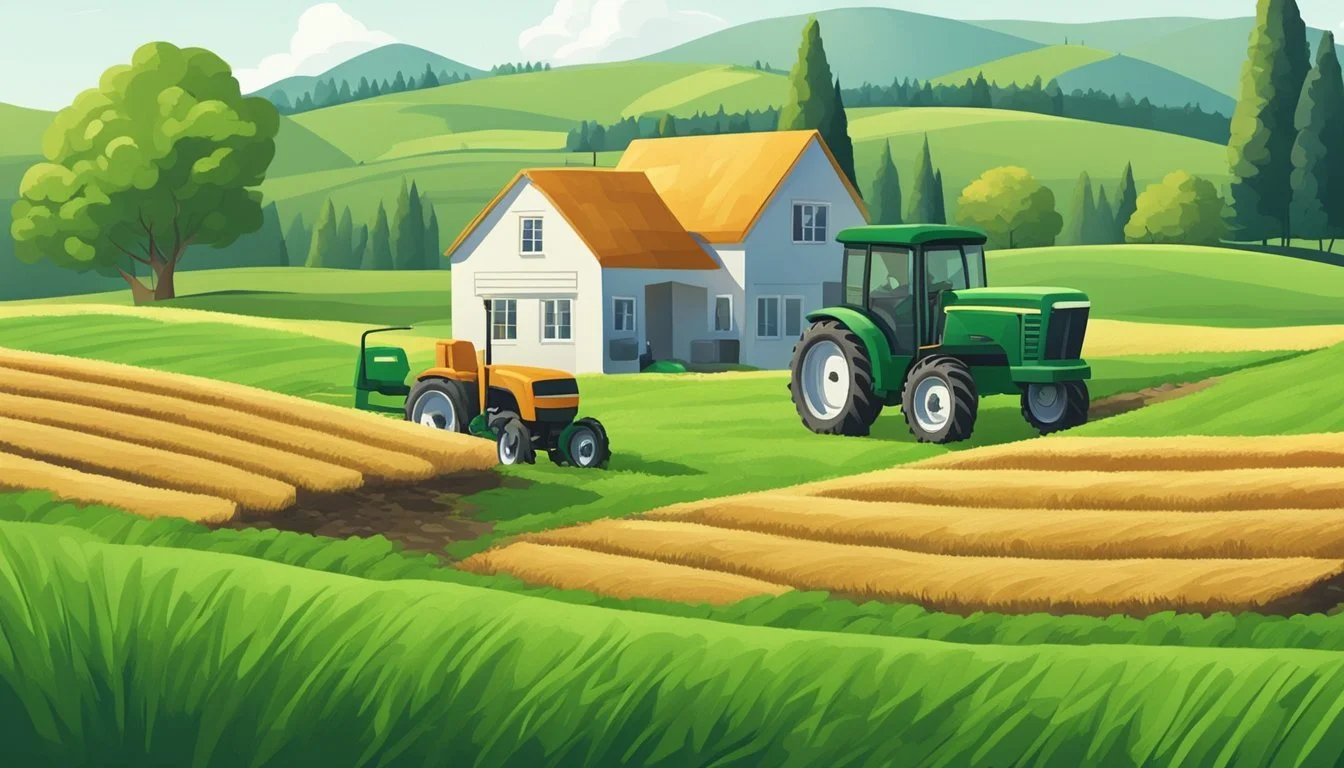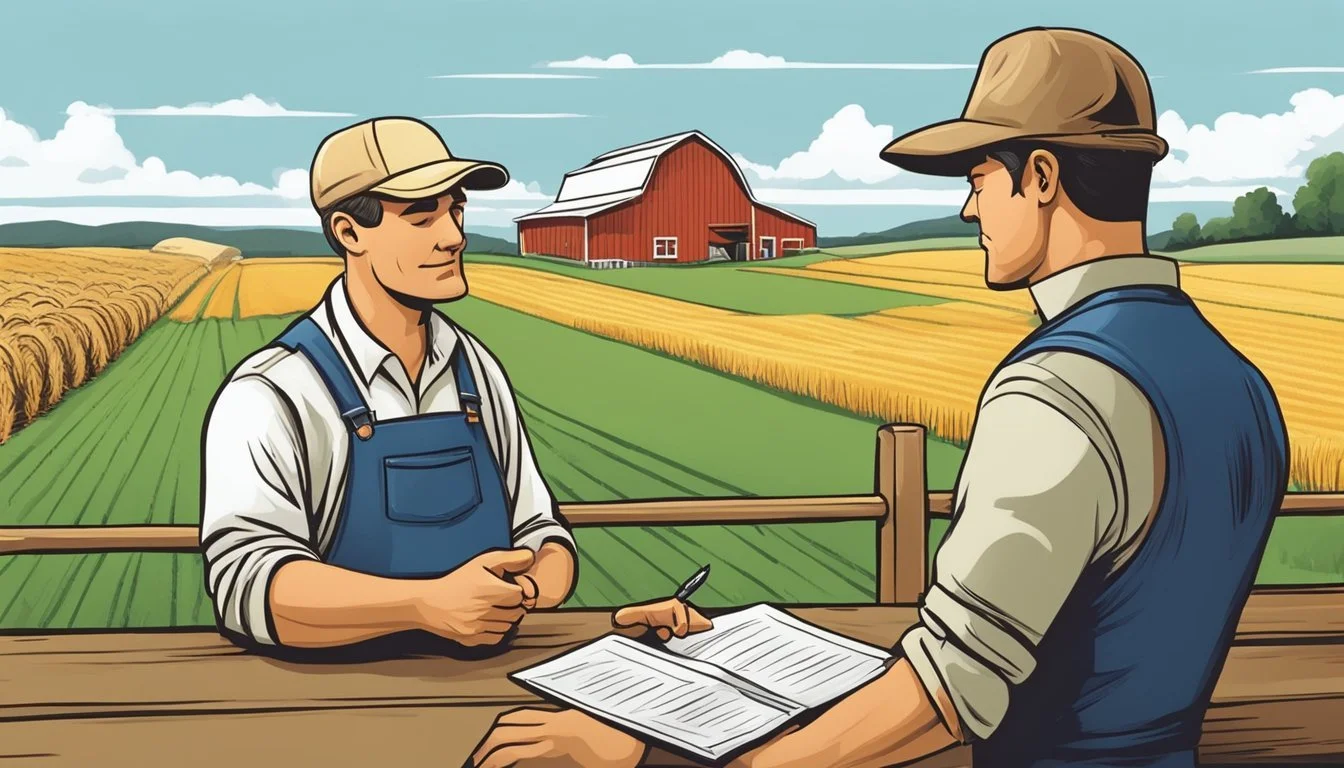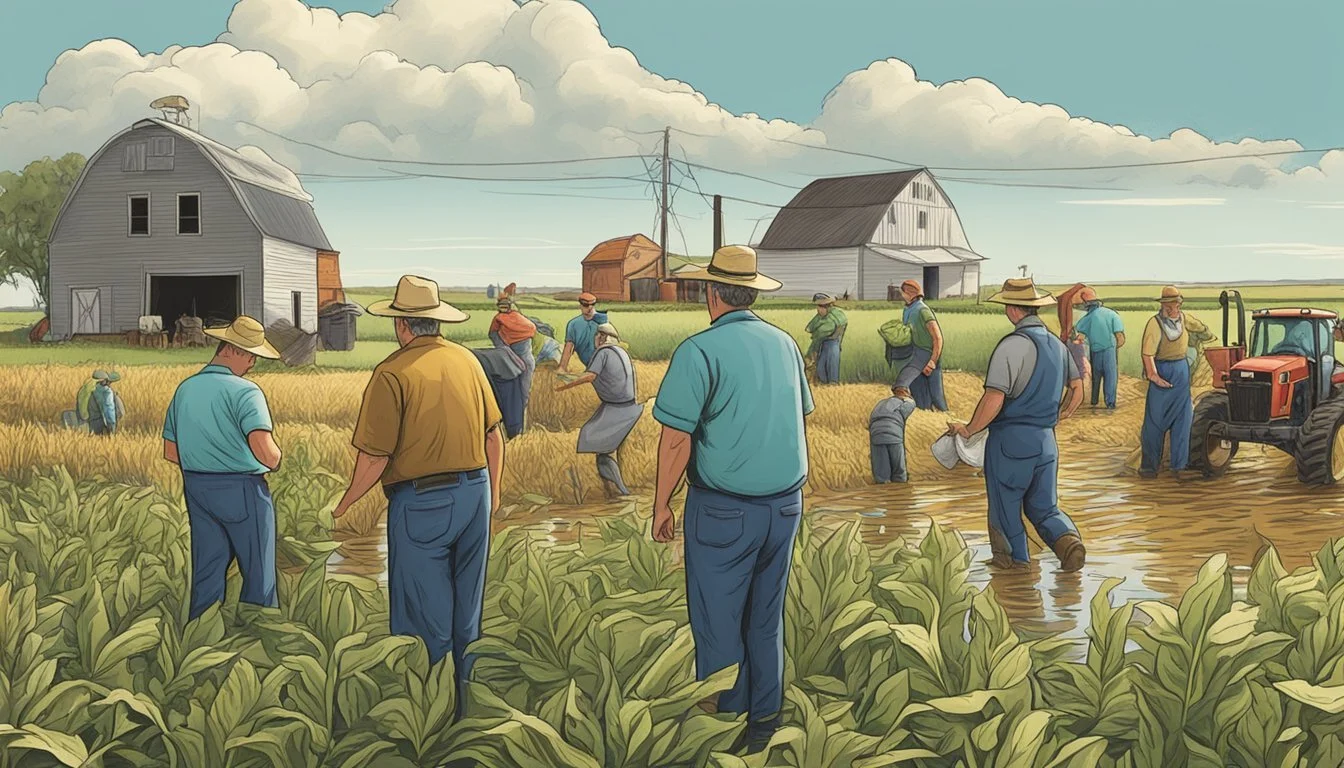Farm Loans in Iowa
Navigating Financing for Your Agriculture Business
This Article is Part of Our Guide on Farm Loans for All 50 U.S. States
Farm loans in Iowa are essential financial tools supporting the state's agricultural community. This type of financing caters to various needs, including purchasing land, equipment, livestock, and making farm improvements. Iowa's economy is deeply interwoven with agriculture, and ensuring that farmers have access to competitive financing options is crucial for the sustainability and growth of this sector. Financial institutions like Farm Plus Financial have recognized this need, offering diverse agricultural loan products with competitive interest rates, tailored to help farmers and ranchers thrive.
The Iowa Finance Authority (IFA) further enhances the support network with programs like the Beginning Farmer Loan Program (BFLP), designed to assist new entrants in the agricultural field. The BFLP, often used alongside other financial aids such as Farm Service Agency (FSA) loans, promotes access to capital for land purchases, equipment, and other essential assets for farming enterprises. Moreover, partnerships between banks and state authorities contribute to the success of these initiatives. For example, Lincoln Savings Bank, in association with the Iowa Agricultural Development Authority (IADA), extends funding under the Beginning Farmer Loan Program to bolster Iowa's agricultural development.
These collaborative efforts between private lenders, state agencies, and federal programs underscore a strong commitment to maintaining farming operations across generations in Iowa. With the agricultural sector being a cornerstone of Iowa's economy, farm loans serve as an investment not only in individual farmers and their families but also in the broader community and the state's economic stability.
Understanding Farm Loans
In Iowa, farm loans are essential mechanisms that enable farmers to manage finances for operations, land acquisition, and equipment purchases. These loans facilitate both entry-level and established farmers in sustaining agricultural productivity.
Types of Farm Loans
There are several types of farm loans available to Iowa farmers:
Farm Service Agency (FSA) Loans: These are government-backed options providing farm ownership loans and operating loans to family-sized farmers who may not secure commercial credit from traditional sources.
Beginning Farmer Loan Program (BFLP): Tailored to assist newcomers in acquiring agricultural property, this program partners with lenders or contract sellers to offer federal tax-exempt bonds.
Guaranteed Loans: Offered by commercial lenders but backed by the FSA, these reduce the risk for lenders.
Microloans: A significant aid for small or niche farm operations, these loans offer smaller amounts with less bureaucratic complexity.
Emergency Loans: Designed for farmers who have been affected by natural disasters, enabling them to restore production capacity.
Components of Farm Loans
Farm loans comprise several elements:
Principal: The original amount of money borrowed.
Interest Rate: Cost of borrowing capital, usually annual percentage.
Repayment Schedule: Terms dictating the frequency and amount of each payment.
Collateral: Assets pledged by borrowers to secure the loan.
Understanding these factors is crucial for farmers to make informed borrowing decisions.
Impact of Interest Rates
Interest rates play a pivotal role in farm loans:
Fixed Interest Rates offer predictability over payments, shielding borrowers from market fluctuations.
Variable Interest Rates can fluctuate, affecting repayment amounts, potentially benefiting borrowers if rates decrease.
Iowa's agricultural financial landscape includes competitive interest rates, with institutions like Farm Plus Financial offering some of the most competitive rates in the market. The right choice between fixed and variable rates depends on each farmer's specific financial situation and risk tolerance.
Beginning Farmers in Iowa
Iowa supports beginning farmers through various programs designed to ease the entry into agricultural businesses. These efforts are aimed at bolstering the state's agricultural legacy by providing financial and educational assistance.
Qualification Criteria
Eligibility for Beginning Farmer Programs:
Age: Must be a bona fide new farmer, which typically implies no substantial ownership of a farming operation prior.
Experience: Possess enough farming experience or demonstrate enough knowledge to ensure reasonable prospects of success.
Net Worth: Subject to limitation, which encourages the assistance of those who might not otherwise afford agricultural property.
Specialized Programs for New Farmers
Beginning Farmer Loan Program (BFLP):
Objective: Helps new farmers acquire agricultural property, including land, equipment, and breeding livestock.
Benefits: Offers loans at reduced interest rates and may be combined with down payment assistance or other financial tools.
Other Financial Aids:
Tax-Exempt Bonds: Provided by the Iowa Finance Authority, these bonds allow lenders to offer loans at reduced rates.
Contract Seller Benefits: Sellers receive a state tax exemption on interest earned from financing a beginning farmer.
Educational Resources and Training
Provision of Knowledge for Sustainable Farming:
Farm Service Agency (FSA): Collaborates to offer educational programs and additional loan facilities.
Local Training: Workshops and programs are available at various Iowa institutions to provide essential skills and agriculture education.
Resources for Continuous Learning:
Online materials and live sessions.
Networking with experienced farmers for mentorship opportunities.
Loan Application and Funding
To secure farm financing in Iowa, applicants must navigate a well-defined application process and understand the various funding mechanisms available, including state-sponsored programs designed to assist beginning farmers.
Preparing for the Loan Application
Prospective borrowers should first compile necessary documentation, which generally includes financial records, a business plan, and credit history. Iowa Finance Authority specifies that a complete Beginning Farmer Loan application must be negotiated with either a lender or a seller. The documentation will help determine eligibility and underpin the terms of the loan, such as the interest rate and repayment schedule.
Loan Funding Process
The loan funding process involves multiple steps, starting with the approval of the application, followed by loan negotiation and the eventual distribution of funds. Particulars mentioned in the search results, such as maximum loan amounts for land, farm improvements, and depreciable property, guide the negotiation phase. According to the Iowa Finance Authority, the maximum loan amounts are specific:
Land: $649,400
New farm improvements and depreciable property: $250,000
Used depreciable property: $62,500
State-Sponsored Loan Programs
Iowa actively encourages agricultural development through the Iowa Beginning Farmer Loan Program (BFLP). This program provides financial assistance for the purchase of agricultural property and equipment. The Iowa Agricultural Development Authority (IADA) collaborates with banking institutions to fund qualified applicants under this program, offering benefits like down payment assistance and tax-exempt bond issuance to reduce overall interest rates.
Farm Ownership Aspects
The journey towards farm ownership in Iowa involves careful consideration of land acquisition, the costs associated with owning and operating a farm, and the development of the necessary infrastructure to support agricultural activities.
Purchasing Farmland
To acquire farmland in Iowa, beginning farmers may utilize the Iowa Beginning Farmer Loan Program, which assists them in buying agricultural property. A maximum loan amount for land stands at $649,400, with farmers negotiating loan terms such as interest rates and repayment schedules with lenders or sellers. This initiative provides vital support in addressing the substantial capital required to purchase farm real estate.
Ownership Costs and Capital Investments
Owning farmland in Iowa incurs various expenses beyond the initial purchase. Farmers must account for service fees, interest rates, and other financial commitments over the life of their ownership. Capital investments include purchasing new or used depreciable property, where the limits are $250,000 and $62,500, respectively. Such investments are often necessary for the deployment of modern farming equipment and technologies to improve productivity.
Building and Improving Farm Infrastructure
The development of farm infrastructure ranges from constructing new buildings to making farm improvements. The USDA Farm Service Agency offers Direct Farm Ownership loans for these purposes, with a maximum amount of $600,000. This financial support is crucial for farmers looking to either construct new buildings or to upgrade existing ones, ensuring they meet the modern agricultural demands. Farm improvements might also involve enhancing the land's productivity and sustainability through various agronomic practices.
Investing in infrastructure not only betters current farm operations but also lays the groundwork for long-term success and growth of farmland in Iowa.
Operating Loans and Operating Costs
Farmers in Iowa rely on operating loans to manage the diverse costs associated with running their agricultural operations efficiently. These loans are instrumental in covering operating expenses such as feed, seed, and equipment, and also help in managing cash flow to sustain farm productivity.
Managing Farm Operating Expenses
Operating loans provide Iowa farmers the financial flexibility to purchase necessary inputs like feed and seed for crops. Family living expenses also fall under the umbrella of operating costs that these loans can cover. The timely procurement of such essential items ensures that farming operations do not face disruptions due to a lack of funds.
Financing for Livestock and Equipment
Funds from operating loans are crucial for maintaining and expanding livestock herds, which may include costs for breeding. Additionally, farmers use these loans to finance the purchase or repair of depreciable machinery and other vital equipment. Access to financing allows farmers to invest in efficient tools that drive productivity on the farm.
Role of Operating Loans in Cash Flow Management
Operating loans play a pivotal role in managing the cash flow for farm businesses, especially to balance the seasonal nature of income and expenses. These loans offer a short-term financial solution, allowing farmers to only borrow what is needed at the moment, offering a structure to repay the loan quickly as farm income is received. This flexibility helps Iowa farmers to maintain a consistent cash flow to keep their operations stable throughout the year.
Loan Repayment and Financial Management
Farm loan borrowers in Iowa must prioritize effective repayment strategies and sound financial management to ensure the longevity of their agricultural operations. The emphasis on loan participation, interim financing, and maintaining a line of credit is critical for financial stability.
Strategies for Loan Repayment
Farmers and ranchers can utilize loan participation as a strategy to manage repayment responsibilities. It enables several lenders to share in a loan, potentially offering more favorable terms and shared risk. For interim financing, they may consider short-term loans which bridge the gap between planting and harvest, allowing repayment when revenue starts flowing. It's crucial that borrowers understand closing costs, ensuring they factor these into their repayment plans.
Managing Financial Risks
Maintaining a line of credit is an essential part of managing financial risks. It offers an accessible source of funds, which can be used as a buffer during unforeseen challenges or low revenue cycles. Proper financial management requires a diligent assessment of cash flow, expenses, and revenue projections. This foresight enables farmers to adjust their financial strategies promptly and effectively, mitigating risks associated with market fluctuations or poor crop yields.
Planning for Long-term Financial Sustainability
Setting the foundation for long-term financial sustainability involves a rigorous review and adjustment of financial plans. Farmers should assess the viability of their operations, considering current debt, projected earnings, and potential savings. They should be well-versed in creating a sustainable budget that aligns with their repayment obligations and goals for future growth. This proactive planning is vital for ensuring the farm's operations can endure through varying economic conditions.
Government Resources and Assistance
Farmers in Iowa have access to a range of government resources and assistance programs aimed at supporting the agricultural sector. These initiatives provide financial aid through loans, with certain programs specifically targeting new and socially disadvantaged farmers.
Federal Assistance Programs
The Farm Service Agency (FSA), an agency of the U.S. Department of Agriculture (USDA), manages several loan programs to assist farmers. They offer loans designed for farmers to start, expand, or maintain their operations. For beginning farmers and socially disadvantaged individuals, programs like the Direct Farm Ownership Loans allocate funds with targeted support in mind. As of recent data, the maximum loan amount an individual can apply for is $300,000.
Loan Types: FSA loans come in various forms, including:
Operating loans
Farm ownership loans
Microloans
Loans for Storage Facility Improvements
Eligibility: The FSA's Loan Assistance Tool is available to help farmers check their eligibility criteria, which include but are not limited to:
Being a family farmer
Meeting citizenship requirements
Having an acceptable credit history
Additionally, the USDA has provided nearly $800 million in assistance to distressed borrowers as part of a broader support package.
State Agribusiness Support
The Iowa Finance Authority (IFA) runs the Beginning Farmer Loan Program (BFLP), fostering the growth of Iowan agriculture by helping new farmers acquire agricultural property. The program features loans at reduced interest rates and can be used with FSA loans or IFA's Loan Participation (LLP). This creates a pathway for farmers to secure the land and capital needed to thrive.
BFLP Features: Key aspects include:
Competitive interest rates
Potential pairing with down payment assistance
Usage: The BFLP can be complementary to other financial mechanisms like:
FSA loan programs
Bank-financed loans through IFA
Iowa also extends support to women, minority, veteran, and disabled-owned agribusinesses with tailored grants and financial programs, ensuring a diverse and inclusive agricultural community.
Tax Considerations for Iowa Farmers
Navigating the complexities of farm taxation can lead to significant financial benefits for Iowa farmers. It’s essential to understand how state income taxes and tax credit programs can affect agricultural operations.
Tax Advantages of Loan Programs
Iowa farmers can benefit from federal tax-exempt bonds when they participate in Beginning Farmer Loan Programs. These bonds allow lenders to offer lower interest rates on loans. Specifically, the Beginning Farmer Loan program is enhanced through the issuance of federal tax-exempt bonds by the Iowa Finance Authority. This can markedly reduce the cost of borrowing for eligible participants.
Iowa-Specific Tax Incentives
The state of Iowa offers targeted tax incentives to support its agricultural sector. The Beginning Farmer Tax Credit is one such incentive, designed to encourage the ownership of agricultural assets by new farmers. The credit is available to landowners who lease to beginning farmers, thus facilitating easier access to land and farming opportunities for the less experienced.
Additionally, Iowa has introduced tax reforms that may benefit farmers. Recent legislation reduced state income tax rates and restructured tax brackets. For instance:
Top tax rate dropped: From 8.43% to 6.5%.
Brackets consolidated: From nine to four.
Furthermore, retired farmers in Iowa may enjoy exemptions from state tax on certain forms of retirement income, including retired farmer rental income, thanks to the state's recognition of the unique financial situation of retirees in the agricultural sector.
Land Ownership and Leasing Opportunities
In Iowa, opportunities for leasing farmland and succession planning play critical roles in agricultural land stewardship and family legacy considerations.
Leasing Farmland in Iowa
Iowa offers various programs to facilitate the leasing of agricultural land to beginning farmers. Landowners may benefit from tax credit programs for leasing to new farmers, with a notable program being the Agricultural Assets Transfer Tax Credit. This program rewards landowners with up to $50,000 per application for leasing land, equipment, and livestock. Additionally, beginning farmers can access lower-interest loans to acquire agricultural property, promoting the growth of farming ventures among new residents of Iowa or those looking to expand.
Examples of Loan Caps:
Land: $649,400
Farm improvements/new depreciable property: $250,000
Used depreciable property: $62,500
These financial incentives are designed to bolster leasing opportunities and make entry into the agricultural sector more attainable for aspiring farmers in Iowa.
Succession Planning and Family Considerations
Succession planning in Iowa often involves family members, including parents, grandparents, and siblings, in the transfer of farmland ownership. The goal is to continue the family farm legacy through generations, and this is sometimes facilitated by favorable loan terms and financial guidance provided by state-sanctioned programs.
Key Points on Succession:
Family members are encouraged to consider succession planning to ensure the longevity of the family farm.
Iowa provides resources and guidance for families to make informed decisions regarding land transfers.
Succession planning is an essential step for resident Iowa families to maintain and pass on their agricultural heritage and assets, thus providing stability and preserving the farming landscape for future generations.
Additional Resources for Farm Loans
Farm loans can be complex, but Iowa offers a variety of resources to assist both the novice and experienced farmers in navigating the labyrinth of financial aid. These resources offer in-depth answers, connections to local authorities, and information on an array of financing options tailored to agricultural needs.
Questions about Farm Loans
For individuals seeking clarification or information on farm loans, it's recommended to contact local financial advisors or the Iowa Finance Authority. They can provide insight into loan limits, application processes, and negotiation of loan terms such as interest rates and repayment schedules.
Iowa Agricultural Development Division (IADD)
The Iowa Agricultural Development Division (IADD) offers support specifically designed for beginning farmers. Programs such as the Beginning Farmer Loan Program help new farmers acquire necessary agricultural properties, equipment, and other assets critical for starting and sustaining a successful farming operation.
Financial Tools and Loan Assistance Options
Farmers in Iowa have access to various financial tools and loan assistance options:
Federal Updates: The USDA periodically updates its farm loan programs to enhance accessibility and equity, accommodating the evolving needs of the farming community, including marginalized groups.
Lincoln Savings Bank: This bank is noted for extending its expertise to farmers, offering agricultural lending and farm financing services crucial for maintaining and growing farm businesses in Iowa.
USDA Assistance: In specific circumstances, such as financial distress, the USDA has provided additional aid, exemplified by the $123 million earmarked in March 2023 for qualifying borrowers at financial risk.
Farmers are encouraged to explore these avenues to secure the financial support necessary for their agricultural endeavors.
Emergency and Disaster Assistance
Farmers in Iowa can access federal assistance programs that provide support in the aftermath of natural disasters through financial and technical aid.
Preparing for Natural Disasters
Iowa's farmers and livestock producers are often at the mercy of unpredictable weather events such as tornadoes, floods, and droughts. Planning ahead for these natural disasters is critical. The Emergency Conservation Program (ECP) and the Emergency Forest Restoration Program (EFRP) are designed to assist landowners with the necessary funds and technical guidance to restore damaged infrastructure like fencing and to recover farmland or forests.
Emergency Loan Programs
In response to severe physical losses caused by natural disasters, the Farm Service Agency (FSA) Emergency Loans become available to eligible family farmers. They may use the funds to:
Restore or replace essential property.
Pay for production costs associated with the disaster year.
Cover family living expenses.
Reorganize the farming operation.
Refinance certain debts, with the exception of real estate.
The deadline for emergency loan applications in response to specific disaster notifications, such as the Administrator Notification Code: N1686, is an important date for farmers to be aware of, with one such deadline being July 5, 2024. These loans are part of an effort to help farmers and ranchers rebuild and maintain the vitality of their operations in the face of adversity.
Supporting Youth and Small Farmers
In Iowa, a myriad of programs are designed to aid both young individuals aspiring to delve into agricultural ventures and those starting out in farming businesses. From youth-targeted loans to broader initiatives for small and beginning farmers, these efforts aim to secure a sustainable future for the state's agricultural economy.
Youth Loan Programs
Youth loans are a pivotal resource provided by entities like the USDA on farmers.gov. They are specifically available for young people between the ages of 10 and 20. Here, individuals can access funds up to $5,000 to initiate or develop income-producing agricultural projects. These loans facilitate their active involvement in organizations such as:
4-H clubs
Future Farmers of America (FFA)
Tribal youth groups
Comparable agricultural youth organizations
Such programs underscore the cultivation of practical farming skills and the development of entrepreneurial endeavor among youth.
Support for Small and Beginning Farmers
The state of Iowa extends its support to small and beginning farmers through flexible financing options and initiatives that actively encourage entry into the agricultural sector. One of the key programs offered is the Iowa Beginning Farmer Loan Program (BFLP). This program assists new farmers in obtaining:
Agricultural property
Equipment
Breeding livestock
Farm improvements
Utilizing federal tax-exempt bonds issued by the Iowa Agricultural Development Division (IADD), the BFLP partners with:
Participating lenders
Contract sellers
By doing so, it furnishes beginning farmers with reduced interest rates on loans, thereby fostering an affordable pathway to farm ownership and operation. This program, along with complementary assistance like down payment aid through Farm Service Agency (FSA) loans or Loan Participation (LLP) loans via the Iowa Finance Authority, represents a concerted effort to empower fledgling farmers in establishing their agricultural legacy.
Success in Iowa's Agricultural Landscape
Iowa's robust farming community thrives on a blend of tradition and innovation. The state's farm loans support this success, balancing heritage and advancement in agriculture.
Preserving Iowa's Farming Tradition
In Iowa, family farms form the backbone of the rural economy. Interest in safeguarding this heritage has led to the creation of financial programs, such as the Beginning Farmer Loan Program (BFLP). This program facilitates the passing down of farming practices from one generation to the next, ensuring that up-and-coming farmers have a way to acquire agricultural property.
Loan Features:
Maximum loan amounts for land: $649,400
Available to Iowa residents over 18
No restriction on off-farm income
These loans provide the opportunity for new farmers to establish themselves within the state's agricultural framework, thereby maintaining Iowa's farming tradition.
Advancing Production Agriculture
Iowa's commitment to agricultural success goes beyond maintaining traditions; the state also fosters advancements in production agriculture. Financial initiatives and tax credit programs offer support to newer farming methods and technologies, which are crucial for the efficient and sustainable growth of Iowa's agribusiness.
State-sponsored programs in Iowa cater to both traditional farming and modern agricultural practices, offering:
Reduced interest rate loans
Tax incentives for landowners leasing to new farmers
These measures are vital for Iowa's production agriculture, as they encourage the adoption of innovative farming techniques that increase productivity and sustainability. With financial backing, Iowa's farmers can invest in new technologies that propel the agricultural sector forward.
Conclusion
In Iowa, Beginning Farmer Loan Program (BFLP) and Iowa Agricultural Development Division (IADD) Loans emerge as comprehensive solutions tailored to support new entrants in the agricultural sector. The Iowa Finance Authority and program partners stand out for their commitment to fostering growth and easing the financial burdens faced by new farmers. For committed individuals eyeing a future in agriculture, these programs provide a valuable springboard.
Specifically, the BFLP is instrumental for acquiring agricultural property, equipment, and livestock. This program is especially beneficial as it can be paired with other financial aids such as the Farm Service Agency (FSA) loans, further extending its impact.
Availability of tax-exempt bonds through the IADD equally plays a pivotal role in financial planning. This benefit allows for more accessible capital, which can be allocated to land purchases, equipment upgrades, and other critical investments necessary for a farm's success.
The involvement of knowledgeable lenders like Lincoln Savings Bank and organizations such as Farm Plus Financial signifies the comprehensive support network available in Iowa. These experts provide invaluable advice and financial services, ensuring farmers are well-equipped to navigate the complex landscape of agricultural financing.
In closing, Iowa's financial assistance programs are designed with the new farmer in mind—facilitating ownership, enhancing agricultural practices, and preserving the state’s rich farming legacy. The synergy between these programs and local financial institutions underlines a robust framework that supports sustainable agricultural entrepreneurship.












